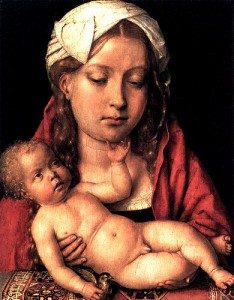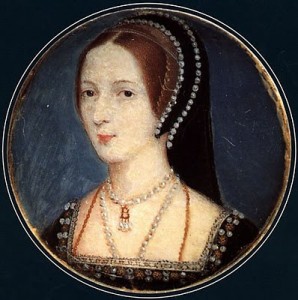 Tragedy struck Catherine of Aragon and Henry VIII on this day in history, 22nd February 1511, when their 52 day old baby boy, Henry, Duke of Cornwall, died.
Tragedy struck Catherine of Aragon and Henry VIII on this day in history, 22nd February 1511, when their 52 day old baby boy, Henry, Duke of Cornwall, died.
Henry, Duke of Cornwall, was born in the early hours of the 1st January 1511, New Year’s Day, and his birth was celebrated with bonfires, wine flowing through the streets of London, cannons firing, pageants, banqueting and an extravagant joust at Westminster which was said to be “the third most expensive spectacle of Henry’s long reign”. Henry VIII had a son and heir and he was going to celebrate in style.
The little boy was baptised at the Chapel of the Observant Friars at Richmond, being named ‘Henry’ after his father and grandfather. His godfathers were William Warham, the Archbishop of Canterbury, and the French King, Louis XII, who did not attend but sent a golden cup and salt as christening gifts. Margaret of Austria was chosen as his godmother, although she also did not attend.
Little Prince Hal was cared for by Elizabeth Poyntz and a staff which included a physician, yeomen, grooms and four rockers to rock the royal cradle. Just fifty two days after his birth, Henry was dead. We do not know what caused his death but it was unexpected. Perhaps it was SIDS (Sudden Infant Death Syndrome or Cot Death). It was a tragedy and little did Catherine of Aragon realise that this loss would ultimately lead to the end of her marriage and little did Henry VIII realise that he would not have another living son and heir until October 1537 – a long wait!
You can read more about little Henry’s birth and the celebrations involved in my article Birth of Henry, Duke of Cornwall – New Year’s Day 1511 and you can read all about Catherine of Aragon’s pregnancies in my article The Pregnancies of Anne Boleyn and Catherine of Aragon
Notes and Sources
- Catherine of Aragon: Henry’s Spanish Queen, Giles Tremlett

Also on this day in history…
- 1540 – Mary of Guise (Marie de Guise), consort of James V, crowned Queen of Scotland at Holyrood Abbey
- 1665 – Death of miniaturist John Hoskins – Hoskins painted a miniature of Anne Boleyn (see image) which was said to be copied “from an ancient original”.
Eric Ives believes that Hoskins had access to an earlier image, probably the same image that the NPG portrait is based on and wonders if the miniature and portrait are actually based on a lost Holbein because in 1590 Lord Lumley owned a full-length portrait of Anne Boleyn and we know that it existed as late as 1773. Whatever the original inspiration for the Hoskins miniature, Ives believes that “it is the best depiction of Anne we are ever likely to have, failing the discovery of new material”. Read more in my article “Anne Boleyn Portraits – Which is the True Face of Anne Boleyn?”
If you haven’t seen this video, where an artist uses Photoshop to bring the Horenbout miniature to life, you should see it. I love how he manages to capture Anne’s spirit. I love the NPG portrait and the Hoskins, but I think this image is now how Anne looks in my head, when she doesn’t look like Natalie Dormer. 🙂
http://www.youtube.com/watch?v=mXyPEqB5FHc
How very different things would have been if little Henry had lived. Also Iove the picture you have put with your article, beautiful.
I, too wonder how things would have been if little Henry had lived. Instead of Edward VI, Mary I and Elizabeth I, we would have had Henry IX. Would Henry IX have had numerous children, continuing the Tudor line, or would he have died without issue, only to be succeeded by his sister, Mary? Who would have succeeded Mary if she, too, died without issue? There definitely would have been no Edward VI or Elizabeth I, since Henry VIII’s marriage to Anne Boleyn and Jane Seymour would never have taken place. Or would Mary have married earlier and had children? Her relationship with her father wouldn’t have been strained due to her loyalty to her mother during the divorce proceedings, so she probably would have been married off, perhaps to a foreign prince, when she was a young woman and more likely to bear children. I wonder if we’d even be following the Anne Boleyn Files today. Katherine of Aragon’s position of Queen would have been secure if she had been able to produce a living son, so in all likelihood Anne wouldn’t have become Henry’s second wife. Perhaps she would have become his mistress, perhaps she would have left court and married another, but she definitely wouldn’t have had the effect on English history that she’s had. But then England would never have had the great Elizabeth I as its monarch. There are so many possibilities – I think that’s what fascinates me so much about history. Unlike a scientific experiment, we can’t rerun the experiment using different critieria!
Nancy,
Katherine of Aragon passed away in January 1536, and King Henry lived on for another 11 years. Even if baby Henry had not died, I think King Henry would probably have remarried. If we give an her earliest possible birthdate, then she would only be in her mid 30s, the Howards and Boleyns were a very ambitious clan, it’s possible that Henry and Anne may still have married. I quite like the idea of Henry and Anne being a cosmic enivitability.
I realize that it’s possible that Henry and Anne may still have married; however, I don’t think that Anne would have occupied the place on history’s stage that she does now. First of all, Henry wouldn’t have broken with the Roman church in order to marry her, and, since Henry would have still been married to Katherine of Aragon in 1532-1533, Elizabeth I wouldn’t have been conceived (or maybe she would have been, but since Henry already would have had an heir and she would have been born out of wedlock she would never have become queen). And, of course, Katherine of Aragon might have lived longer if she hadn’t suffered from Henry’s ill treatment – she was sent to damp castles in the Fens that certainly didn’t do her health any good. Anne also probably wouldn’t have become the first English Queen to lose her head (which would have ended with a happier outcome for her)!
Great and very interesting~~~~~Thanks for sharing, Diana